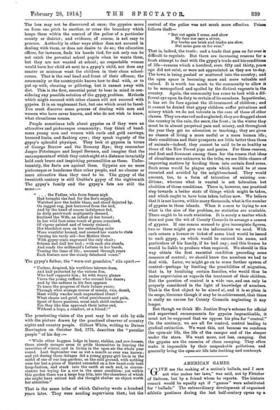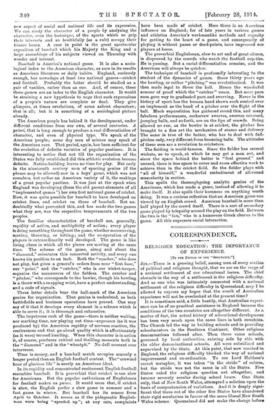AMERICAN GAMES.
"GIVE me the making of a nation's ballads, and I oars not who makes her lawe," was said, not by Fletcher of Saltoun, but by a friend whom he reports. The historic remark would be equally apt if "games" were substituted for "ballads." The extraordinary development of organized athletic pastimes during the last half-century opens up a
new aspect of social and national life and its expression. We can study the character of a people by analysing the character, even the technique, of the sports which so grip their interests and so healthfully (as a rule) occupy their leisure hours. A case in point is the great spectacular exposition of baseball which his Majesty the Xing and a large assemblage of his subjects viewed on Thursday with wonder and interest.
Baseball is America's national game. It is also a socio- logical index to the American character, as sure in its results as American literature or daily habits. England, curiously enough, has nowadays at least two national games—cricket and football. Probably the latter should be studied as a pair of vanities, rather than as one. And, of course, these three games are an index to the English character. It would be straining a new hypothesis to urge that such expressions of a people's nature are complete or final. They give glimpses, at times revelations, of some salient characters ; that is all; but it is something of a sociological picture already.
The American people has behind it the development, under different conditions from our own, of several centuries. A priori, that is long enough to produce a real differentiation of character, and even of physical type. We ,peak of the American people ; some day men of science may speak of the American race. That period, again, has been sufficient for the evolution of definite varieties of popular pastimes. It is interesting to notice that not till the organization of the States was fully established did this athletic evolution become definite. Nation-building leaves no time for play. Bnt early in the nineteenth century men of sporting genius (if the phrase may be allowed) saw in a boys' game, which was not rounders, but rather an American variety of it, the makings of a great popular pastime. It was just at the epoch when England was developing (from the old parent-elements of all "implemented games ") her own first national game of cricket. Now, it was quite possible for baseball to have developed on cricket lines, and cricket on those of baseball. But un- doubtedly what prevented this, and has made the two games what they are, was the respective temperaments of the two peoples.
The familiar characteristics of baseball are, generally, rapidity of action, and multiplicity of action; every player is doing something throughout the game, whether manoeuvring, moving, throwing, or hitting ; and the co-operation of the players is extraordinarily well developed. The game is like living chess in which all the pieces aro moving at the same time. The scheme of the game, along and about the "diamond," orientates this concerted activity, and every one knows his position to an inch. Both the "coacher," who does not play, but gives a general's orders from near "first base," our "point" and the "catcher," who is our wicket-keeper, organize the manceuvres of the fielders. The catcher and "pitcher," who corresponds to the bowler, though his bowling is a throw with a snapping wrist, have a perfect understanding, and a code of signals.
These latter details hear the hall-mark of the American genius for organization. That genius is undoubted, as both battlefields and business operations have proved. One may my of it that it develops every element in a scheme which is able to serve it ; it is thorough and exhaustive.
The impetuous rush of the game—there is neither waiting, nor marking time, nor playing out time—expresses (as it was produced by) the American rapidity of nervous reaction, the restlessness and that go-ahead quality whirls is affectionately (as it were) termed hustling. When this character is in action it, of course, produces critical and thrilling moments both in the "diamond" and in the "wheatpit." No dull moment ever intervenes.
Time is money, and a baseball match occupies scarcely a longer period than an English football contest. The" crowded bone of glorious life" is surely an American ideal.
In its rapidity and concentrated excitement English football resembles baseball. It is proverbial that cricket is too Blow for Americans. But the popular enthusiasm of Englishmen for football makes us pause. It would seem that, if cricket is slow, the English prefer a slow game in summer and a fast game in winter. But baseball has its season from April to October. It seems as if the phlegmatic English. man were being "speeded up"; at any rate, complaints have been made of cricket. Here there is an American influence on England; for of late years in various games and athletics America's workmanlike methods and capacity for getting to the heart of a game, and consequently of playing it without pause or dead-points, hare impressed our players at home.
The proverbial Englishman, slow to act and of great silence, is disproved by the crowds who watch the football cup-ties. He is passing. But a racial differentiation remains, and the American will always be quicker.
The technique of baseball is profoundly interesting to the student of the dynamics of games. Some thirty years ago the bowling, or rather "pitching," was revolutionized. It was then made legal to throw the ball. Hence the wonderful armour of proof which the "catcher" wears. But mere pace soon gave way to graduated pace and swerving. Never in the history of sport has the human hand shown such control over an implement as the hand of a pitcher over the flight of the ball. Much superstition has gathered round this, and many fabulous performances, corkscrew swerves, swerves rerersed, jumping balls, and so forth, are on the lips of crowds. Being allowed no ran, as the bowler is at cricket, the pitcher has brought to a fine art the mechanism of stance and delivery The same is true of the batter, who has to deal with full- pitches only, very different from bouncing balls. The attitudes of these men are a revelation to cricketers.
The fielding is world-famous. Sines the fielder has several wickets, so to speak, at which he may get a man out, and since the space behind the batter is "foul ground" and unused, there is less space to cover and more effective work to achieve than in the cricket field. So the fielder plays with "all of himself," a wonderful embodiment of all-round muscularity in motion.
This spells the thoroughgoing analytic genius of the Americans, which has made a game, instead of allowing it to make itself. It also spells their keenness on anything worth doing. It was a curious reflection that an American game was viewed by an English crowd. American baseball is more than half played by the crowd itself. There is a sort of secondary game played by telepathy around the play on the field. Between the two is the "fan," who is a humorous Greek chorus to the game. All this expresses social interaction.















































 Previous page
Previous page